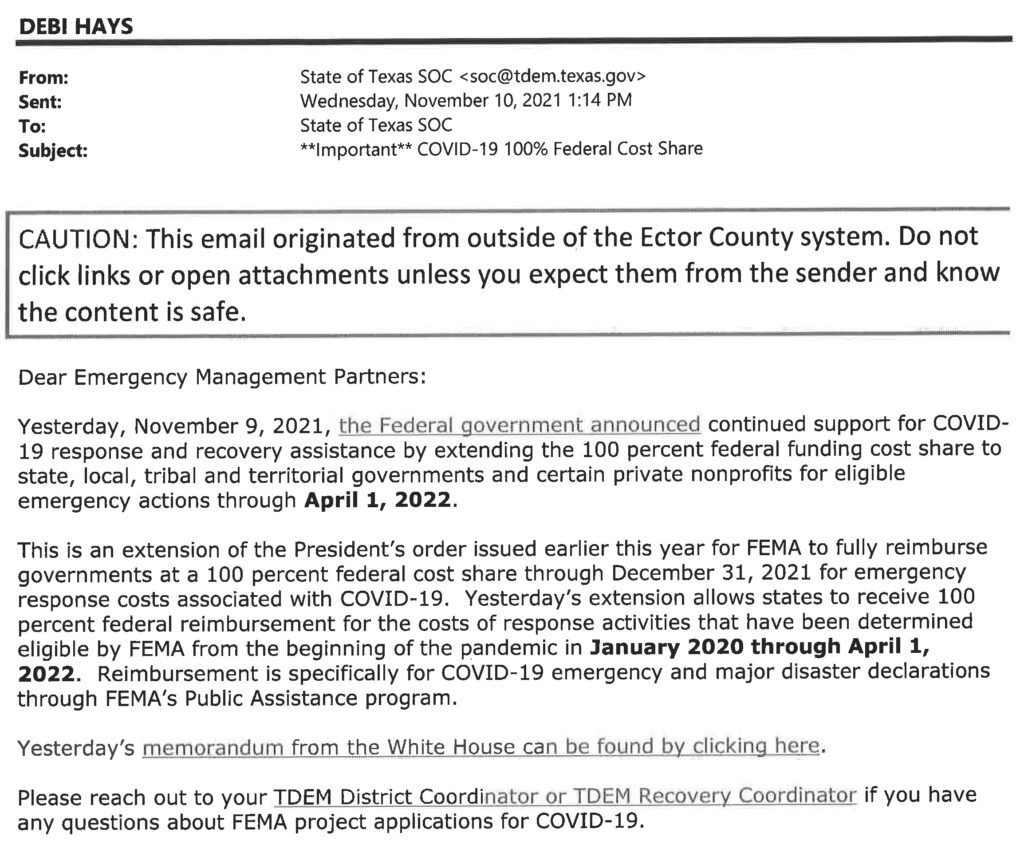The Ector County Commissioners Court is scheduled to choose a consulting firm Tuesday to help them spend $32 million in funding from the American Rescue Plan Act.
The county commissioners voted 5-0 in September to hire a firm to vet applications and conduct audits before moving forward on any requests.
County Judge Debi Hays has said without the firm the county risks the possibility of spending money that doesn’t qualify under ARPA’s 400-pages of guidelines and taxpayers having to pay it back.
On Saturday, Hays again defended the court’s decision.
The way she looks at it, the county has two choices. It can spend $250,000-$275,000 annually for the next four years to hire additional county staff to vet the applications and conduct audits or it can spend that amount or less to hire a firm that actually has experience dealing with natural disasters and the federal treasury.
People don’t realize just how few employees work in the county’s purchasing and auditing departments and are responsible for handling the county’s $85 million annual budget, Hays said. They also don’t understand how much of a burden the $32 million in ARPA funding would be on those employees.
In addition, Hays said the county is under a deadline to allocate the ARPA funding and doesn’t have the time it would take to hire additional county staff to allocate those funds. She pointed out the county hasn’t been able to fill its human resource director position in nearly a year.
At least six firms submitted bids for the ARPA-funding job and a committee appointed by the county has whittled them down to one, Hays said.
Once one is approved by the court, the purchasing department will negotiate the terms of their contract and it will likely be up for a vote at the court’s next meeting, she said.
Hays came under attack for the court’s decision to hire a firm during a recent Lions Club event.
Medical Center Hospital asked for $7 million in ARPA funding and Odessa Regional Medical Center requested $2.6 million.
Hays’ opponent in March’s Republican primary, Dustin Fawcett, said that by delaying the distribution of funds the county missed a Dec. 31 deadline that would’ve allowed FEMA to reimburse 100% of the funding.
Fawcett said he was “embarrassed” and saddened by the court’s decision.
“Why do we have elected officials if we’re going to hire people to tell us how to spend our own money? I have an issue with that,” Fawcett said.
Losing out on that money was “inexcusable,” Fawcett said, noting many counties had already determined how they were going to spend the funds months ago.
President Joe Biden extended the Dec. 31 deadline to April 1 back in November, Hays said.

During the Lions Club event, Hays assured members the hospitals would be at the top of the list of recipients, but during a September commissioners meeting she questioned whether either hospital needed the funds.
“I’m not saying that I’m for, or against giving funds to the hospitals,” Hays said. “The hospitals have surely done much good and have been heroes. But at some point, through the normal process, the question has to be asked, ‘how much money do you need?’”
Last week, Hays said it’s the county’s job to get them whatever it is they need.
“The hospitals have always been at the top of my list. I’ve never not been for helping the hospitals.”
Hays said she never wants to be compared to Nancy Pelosi and comments she made about the Affordable Care Act.
Back in March 2010, the then-Speaker of the House said “But we have to pass the bill so that you can find out what’s in it….” at the Legislative Conference for the National Association of Counties.
The commissioners are also scheduled to discuss game room regulations on Tuesday.
Last week, the Odessa City Council instructed City Attorney Natasha Brooks to send a letter to Hays, County Attorney Lee McClendon and all of the county commissioners asking them for their input on proposed game room ordinances and giving them a Feb. 15 deadline.
The council hopes to join forces with commissioners to help address the proliferation of game rooms throughout the county and the corresponding problems some of them are causing local law enforcement.
The city would like to restrict such establishments to light industrial or heavy industrial zones, and restrict their hours of operation to 8 a.m. to 11 p.m. Monday through Thursday and 8 a.m. to midnight Friday through Saturday. They’d also like to make sure they are located at least 1,000 feet away from other gaming establishments, churches, schools, healthcare facilities, public buildings or residential areas.
The city wants the county’s help because Brooks told the council that under state law, only counties can enforce a 1,000 foot rule, not cities.
The commissioners are also scheduled to accept a $20,000 donation from Occidental Petroleum Corporation for the Ector County Sheriff’s Office and discuss developing cemetery plots at the Ector County Cemetery.
FEMA Funding for COVID-19 Response Continues




